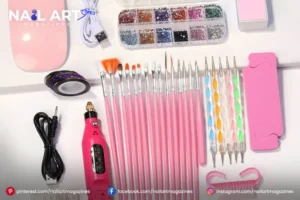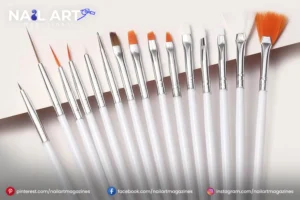Nail Brushes For Nail Art
Nail Brushes For Nail Art: Introduction
Finding the perfect nail art brushes is not easy. When we invest in high-quality brushes, we can get better results because they are specifically designed for precision and control in nail designs. In the world of nail art, there are various types of brushes and tools for achieving any kind of design.
Why should we use Nail Brushes For Nail Art?
They are designed to clean the areas under the fingernails and around the cuticles. Where regular nail polish is generally not effective, these brushes have stiff bristles that can dissolve germs and bacteria and ensure more through cleaning.

Types of Nail Brushes For Nail Art with uses
Nail art brushes come in different shapes, sizes, and functions. Each brush has a different functionality and is suited to a specific design for its creativity.
Liner brush
One of the most common types of brush in nail brushes for nail art is the liner brush, otherwise known as a striper nail brush. With this brush, we can draw straight lines and smaller details.
The liner brush can vary in size and detail depending on the design you are looking to create. However, it is usually quite thin on the end. The liner brush is excellent for geometric design and other detailed effects.
Detail brush
Detail brushes are great for cleaning the intricate areas of your vehicle dashboard and center console. Use a small brush with soft bristles to remove dust and dirt. This brush will help you reach the tight spaces.
Fan brushes
A fan brush is used to dust off any fallout and apply highlight on the highest point of the nail. A large fan brush is usually made of natural fibers and fanned out 180 degrees to cover a large perimeter of the face.
Round brushes
A round brush can be used in several ways, such as filling, drawing, washing, applying washes, and producing a thin line for detail by releasing a small amount of color from the tip.
Flat brushes
A flat brush is a medium-length brush whose bristles have been cut straight across. Flat brushes are used for painting flat surfaces such as base nails.
With a flat brush, you can create one stroke very easily, and they can also be used for blending and shading. Flat nail brushes for nail art have the advantage of being very easy to use when applying acrylic along the length of the nail.
Dotting tools
The dotting tool is one of my favorite tools for creating dot nail designs, and it is effortless and straightforward for beginners. Another way to create dots is to use bobby pins. Bend the pin and use the rounded end to make perfect dots every time.
Angular/slanted brush
The angular brush is perfect for blending in tight areas and other hard-to-reach areas, and making curves to fill the designs. This brush is particularly used for French tips and creating V-line shapes. For a defined look, the angular brush works best.

What are the materials and quality of the Nail Brushes For Nail Art?
Nail brushes for nail art come in two qualities: natural and synthetic bristles. Each has its benefits.
Natural bristle
Natural bristles are made with animal hair. These brushes provide smooth strokes and a soft feel. Natural bristles are perfect for intricate designs and fine detail.
Synthetic bristle
These bristles are made of nylon and polyester, which is affordable, durable, and perfect for gel nail polish. The handle material is also important. Acrylic handles are common in use; they are light weight and durable. Wooden handles give you a traditional feel, and they require extra care from water.
Which techniques can we use in Nail Brushes For Nail Art?
You can learn some techniques which a nail art brush can bring out the best result in your designs.
Gradient with a fan brush
Apply a small amount of polish to the fan brush and lightly sweep across the nails in one direction, layering the color gradually to create a smooth gradient.
French tips with angular brush
Dip the angular brush in polish, press it onto the nail tip at an angle, and create a clean line in a single stroke.
Detailing with a fine brush
Detailed brushes come in different sizes and lengths. This brush is typically thinner than other brushes and gives better stability. We can use it with a steady hand and add tiny details like leaves, intricate swirls, and lace patterns. Just dip the tip in a small amount and make short strokes.
Line work with striping brushes
This long and thin brush is for making strips across your nails. It can be dragged across the nails vertically and horizontally, leaving a lovely line. It is also suitable for creating check nail art designs.
How can you maintain Nail Brushes For Nail Art tips for longevity?
Proper care and maintenance can increase the life of your brushes. I can give you some tips and tricks that, if you follow, will get you better results.
Clean immediately when using.
Always clean your brushes after use, especially when you are using gel nail polish. You can use cleaner for natural bristles and acetone for synthetic bristles.
Store properly
You should use a brush holder to store the brushes, take care of these bristles for bending, and protect the bristles with a cap.
Avoid too much acetone.
You should avoid using too much acetone; it can damage natural bristles over time. Use it only when necessary.
Regular deep cleaning
Regular deep cleaning is very important. You can clean it once a week with a cleaning solution or warm, soapy water. For natural bristles, use conditioner.

Conclusion
You should invest in high-quality brushes. Practice can make you perfect for creating unique designs. With the right tools, you can achieve professional and intricate designs that elevate your nail art to the next level. We can add highlights and line patterns with the right nail brushes for nail art, and get a salon-quality result




